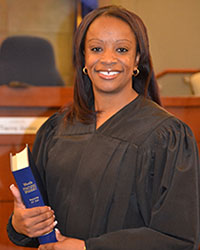A Modern Approach to Dispensing Justice
COVID-19 pandemic forces court system to adapt to the times. We all will be better for it

By Judge Tierra D. Jones
Your favorite GPS app will tell you that only 320 miles separate Hawthorne, Nevada, from the UNLV William S. Boyd School of Law. I’m here to tell you that distance might as well be 320,000 miles. I know, because I grew up in Hawthorne, a rural town in the middle of the state that abuts the California border.
How rural? With a population that barely eclipses 3,000, my childhood hometown has fewer residents than some Las Vegas Strip resorts have hotel rooms. So, needless to say, I encountered a bit of culture shock when I arrived on the UNLV Boyd Law School campus in summer 2003. It didn’t take but a day to realize that acclimating to my new environment wouldn’t be my only challenge.
Learning to navigate law school—how to study, when to study, where to study, what to study—is different than any other stop along the educational journey. And it was up to me to figure out a system that worked best. Looking back, adapting to life as a law student during those first days and weeks was almost as difficult as the coursework itself.
I hardly knew it at the time, but the adaptation skills I developed early on at UNLV Boyd Law would serve me well throughout my career as both a practicing attorney and, for the past four years, as a district court judge. Never was this more evident than when the COVID-19 pandemic hit and instantaneously altered how we lived and worked.
I’ll never forget the meeting we had on a Friday in mid-March 2020 when we decided to close the courthouse doors the following Monday. Just like that, the perpetually spinning wheels of justice ground to a halt.
At the time, it was unclear just how long the pause would last. But one thing was clear: The pandemic would require all of us—judges, attorneys, administrative staff, etc.—to adjust to a new way of conducting business. And that’s when another important skill I honed during my time at UNLV Boyd Law kicked in: the art of collaboration.
Working together, the court embraced technology like never before. For instance, we transformed into a paperless court overnight; we conducted hearings and permitted witness testimony via videoconference; and we streamed proceedings online to accommodate those who weren’t allowed to be in the courtroom. There were challenges, of course—after all, not everyone readily welcomes technology, especially in the legal world—but in the end, there was an overwhelming consensus that these changes were necessary to efficiently dispense justice at a time of global chaos.
Those changes weren’t limited to technology. When jury trials resumed in earnest on February 1, 2021, two of our courtrooms looked completely different. To adhere to health and safety protocols, all public seating was removed and clear partitions were installed at counsel tables, around the judge’s bench, and in the jury box.
Yet another sign of adaptation and collaboration working in tandem: While criminal trials took place in these redesigned “COVID courtrooms,” civil trials were relocated to makeshift courtrooms at the Las Vegas Convention Center, which had plenty of space to lease because of the pause in convention business.
Thankfully, just like in other facets of life, the justice system is ever-so-slowly returning to some semblance of normalcy—and just like in other facets of life, it’s a “new normal.” Because one thing the pandemic did was force the justice system to accelerate its long-overdue leap into the 21st century. There’s no question we operate more productively and efficiently—and with greater flexibility—than we did before March 2020. Not only is that a win for society at-large, but it will prove particularly beneficial to current and future UNLV Boyd School of Law students who pursue careers in civil and/or criminal law.
Speaking of students, I offer all of you—regardless of where your J.D. may take you—these parting words of wisdom: Your law school experience isn’t only about learning case law, writing papers, and marathon study sessions. It’s also about forging bonds with fellow students, faculty, and staff, and leaning on each other, especially during challenging times.
Maneuvering through the past year reminded me just how strong and valuable UNLV Boyd Law’s support system is. Trust me when I tell you that support system will be there for you, too—no matter if you come from a big city or little ol’ Hawthorne.
Judge Tierra D. Jones is a 2006 graduate of the UNLV William S. Boyd School of Law and a District Court Judge in Department 10 of the Eighth Judicial District Court.